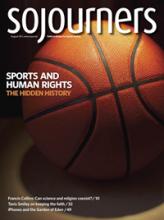The notion that professional sports has anything to do with social justice and human rights would be seen as laughable by most members of the athletic community. Sports, we are told, are about escape, excitement, and a respite from the ills of the world. This is why Supreme Court Chief Justice Earl Warren said, “I always turn to the sports pages first, which records people’s accomplishments. The front page has nothing but [people’s] failures.”
But there is a rich tradition of athletes who commit to a life of good works, as well as “jocks for justice” who use the platform of sports to speak out about human rights. The examples are as diverse as they are extensive. From civil rights advocate Paul Robeson to suffragists Elizabeth Cady Stanton and Susan B. Anthony, access to sports was central to their struggles for liberation. As Robeson remembered of his days desegregating the Rutgers University football team, “When I was out on a football field or in a classroom or just anywhere else, I was not there just on my own. I was the representative of a lot of Negro boys who wanted to play football and wanted to go to college, and as their representative, I had to show that I could take whatever was handed out.”
Or as Cady Stanton wrote in the women’s magazine The Lily, rejecting claims of a man’s “physical superiority”: “We cannot say what the woman might be physically, if the girl were allowed all the freedom of the boy in romping, climbing, swimming, playing hoop and ball.”
Read the Full Article

